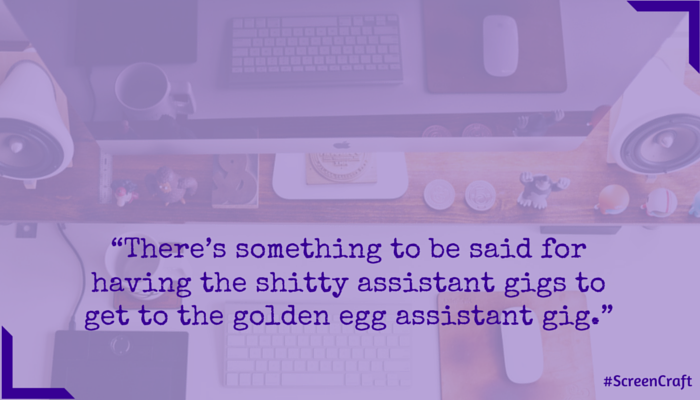3 Screenwriting Lessons from Rising TV Writer’s Assistants

View From the Bottom
If you want to know how to break into screenwriting in Hollywood, don’t look for advice from the stalwarts who broke in last century, look to the next generation of writers — those breaking in NOW. Look to the writer’s assistants.
These are the young guns working in television who schlep coffees and make copies, all the while building relationships with the people who can give them their first big break.
Do you have a pilot that needs to be read? Enter the ScreenCraft TV Pilot Screenwriting Competition here.
Here are key learnings from a series of interviews that we did with current writers assistants. Note that, while the lessons learned are fascinating, everyone’s story is unique and there is never only one way in.
Lesson #1: Find Your Fraternity
Not a single one of the writers interviewed here got started without a little help from their friends. In Hollywood, those friends were fellow assistants at talent agencies like William Morris Endeavor, Creative Artists, Gersh, or Paradigm.
Jessica Kardos is a Showrunner’s Assistant on USA’s Covert Affairs.
“Assistants are like a little fraternity of people, and you’re going to be tapping into those relationships throughout your career,” says Kardos.
Kardos moved to LA right out of college and landed a job at the Gersh Agency, assisting a feature lit agent who taught her loads about the business of Hollywood. She moved up at the agency — eventually assisting David Gersh himself — before an old college connection (who was also working as an assistant) helped her transition to a job on Covert Affairs.

Recently, Kardos met an old assistant friend from the talent agency. He had read her original material and wanted to pass along a script to his boss at Gersh. The agent loved it. Kardos now has representation and has been scheduling meetings at various studios around town.
Her best advice for aspiring writers? “Work at an agency. Seriously.”
For Kardos, the assistant fraternity was the key.
Lesson #2: Your Script Won't Get You the Job
Lauren Certo, a Showrunner’s Assistant for both The Flash and Arrow at the CW, got her start as an Office PA before transitioning to a Writer’s Assistant position on Fox’s Bones.
“My original pieces didn't matter a lot in terms of getting my first job or any thereafter. It was important I wanted to BE a writer and wanted to learn, but in all the interviews I have gone on for jobs no one has really asked to specifically read a piece,” says Certo.
But in Certo’s opinion, maybe that’s a good thing.
“I think once you are able to see the process as an assistant it's important to then go and apply that to your own work so that — when the time comes when someone wants to read it — you feel most prepared.”

“Just be a sponge. If you are working a job that just pays the bills and has nothing to do with writing, great, look at that as an opportunity to observe or write stories or draft ideas from the environment that you are in. And if you are in a position where you are exposed to writers, really utilize them as much as you can.”
Lesson #3: Have One Good Original Script
So what happens when you’ve made your friends, you’ve got your first job, and a staff writer is interested in reading one of your scripts?
Michael Levin was a Script Coordinator on a TBS original comedy called Your Family or Mine.
Says Levin, “Some people still like specs, but for the most part it’s ‘show me an original pilot.’ You don’t need 15 scripts to show someone. They’re going to read one. Have one good script. That will do everything for you.”

In Levin’s opinion, there are two tracks:
“You can be the person who writes their head off and tries to sell shows or movies or whatever — you’re at a coffee shop writing and writing and getting better. Or you can try and go through the system and work your way up through a show. I tried to do both. Why not have two tracks going at once, and whatever one hits first hits first?”
On his first track, Levin wrote a feature script with a friend while working as an assistant at a talent agency. They submitted the script to competitions and emerged as a finalist at the Austin Film Festival.
That led to meetings with managers’ assistants, one of whom hit it off with Levin. They agreed to develop one of Levin’s pilot concepts together, then present it to the assistant’s boss, a manager, who loved it and ultimately signed Levin. It all started with one good script.
On the second track, while working at the talent agency, Levin got the ear of one of the producers on How I Met Your Mother. He emailed her about PA opportunities but there was nothing doing, so he kept emailing her for about a year before finally getting the opportunity to start work as a Night PA, which, in Levin’s words “basically means you deliver scripts and get dinner.”
After a few seasons, Levin had worked his way up the assistant’s ladder, while learning about the craft of screenwriting from one of the best writer’s rooms on television.
At first, the view from the bottom can seem daunting and lonely. But not to the assistants who are out there doing it. Theirs is a story filled with connections, growth, and hope.
“It’s all about making friends. And I think there’s no one way to do it. Just get in any way you can and find like-minded people who are also looking to create and further their own careers,” says Levin.
How are you breaking in? Do you have a screenwriting fraternity? Let us know in the comments below.
Keep. On. Writing.
Get Our Screenwriting Newsletter!
Get weekly writing inspiration delivered to your inbox - including industry news, popular articles, and more!


























